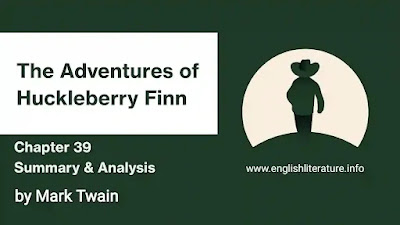Also Read
SUMMARY
Tom and Huck manage to catch about fifteen rats and hide them under Aunt Sally's bed. While they go hunting for some spiders and other inmates for Jim, one of the sons of the family, spurred by curiosity, opens the door of the rat-trap and sets them free. Aunt Sally is outraged because of this ruckus in her house and gives the boys a good beating Not ones to be dispirited by this, the boys collect a "splendid stock" of Spiders, bugs, frogs, caterpillars and a dozen garter-snakes and house- snakes. After a "good honest day's work", they discover that the snakes are gone. Despite Aunt Sally's disgust at having snakes all over the house, the boys get on the job of collecting them again. Finally, Tom is pleased with the "blithesome" cabin that Jim has with all the creatures swarming out for music.
Uncle Silas decides to advertise for Jim in the local newspapers because he has not received any response to the earlier letters that he had written to the non-existent owners of Jim. Alarmed by this, Huck urges Tom to hasten the process of Jim's escape. Tom decides to write a nonnamous letter to 'warn' people that "something is up". Huck pinches the servant-girl's gown to go and slide the letter from under the door into the house. The letter reads, "Beware. Trouble is brewing. Keep a sharp look-out.
"Unknown Friend"
They draw a picture with skull and crossbones and stick it on the front door. The family is petrified to see these pictures. The next night, the boys draft another letter that warns them ot a "desperate gang or cut-throats" who are scheming to steal the nigger in captivity.
CRITICAL ANALYSIS
Twain paints a critical and uncomplimentary picture of Tom. Due to his excessive dependence on novels and stories, he creates nuisance for people. He has already created enough trouble and now he wants to write the anonymous letters to "warn people that something is up". Prompted by his juvenile behaviour, he doesn't take cognizance of the trouble he is causing to "the innocentest, best old soul" - people who have been so kind to him. He wants to give people "notice" so that all their "hard work and trouble" doesn't go "flat". In his pursuit of adventure, he ignores the practical side of things. He fails to foresee the commotion that his "nonnamous" letter would create (as it indeed does in the following chapter). As readers, we may be willing to ignore Tom's juvenile behaviour as "silly" and "acceptable" for an adolescent. But Twain is trying to drive home the point that Romanticism can be not just 'silly' but 'dangerous' too. Tom doesn't realize that a momentous and important endeavour, such as Jim's escape, takes precedence over the rest of the frills and fancies attached to the drama. By unnecessarily prolonging the exercise, he is risking everyone's life.
According to the books, a prisoner is helped to escape dressed up in his mother's clothes while the mother stays back in the prison. Tom consents to being the "mother" but as soon as he realizes that he would have to stay back in the cabin, while Huck and Jim escape, he backs out. He would rather "stuff Jim's clothes full of straw and lay it on his bed to represent his mother in disguise". Tom's adherence to his "Principles" can be slackened when the situation doesn't suit him. This permissiveness is reminiscent of that in the beginning of chapter 36.
